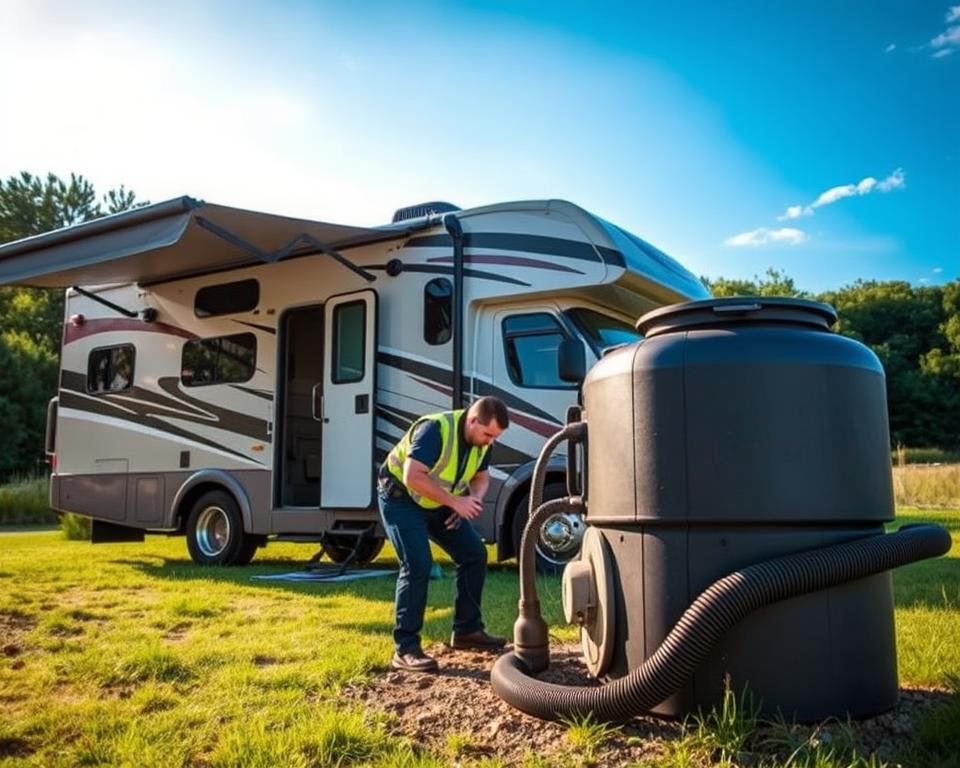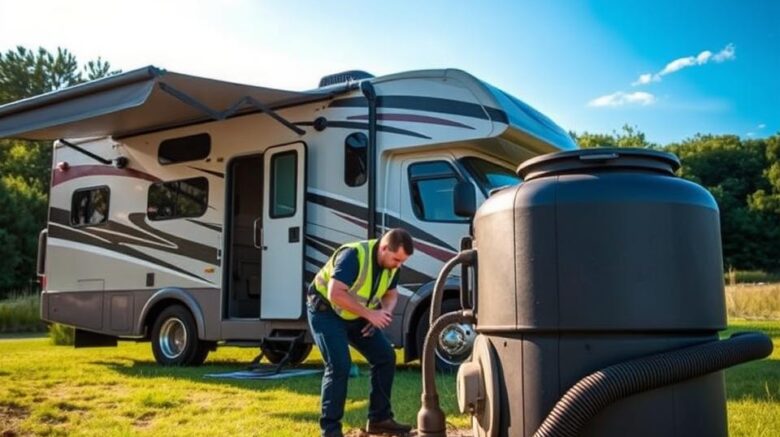RV Waste Pump: Critical Maintenance Guidelines
Are you sure your motorhome’s black water pump is trip-ready, or could it trigger campsite headaches? Keeping your motorhome’s waste system in peak form is essential. It lets you avoid foul odors, obstructions, and hefty fixes. This guide provides key advice to make sure your sewage pump operates without a hitch, keeping your travels trouble-free.
Grasping Your RV’s Plumbing System
The RV plumbing system is crucial for any pleasant excursion. It splits into two main parts: the black water system and the gray water system – RV waste water pump. The black water system holds waste from the toilet, whereas the gray water system processes wastewater from sinks and showers.
The systems employ drain lines that feed into different tanks, designed for streamlined waste management. Each tank has a vent to avert gas from building up, guaranteeing the operation is safe and pleasant. Proper waste management in an RV is key to forestall leaks or bad odors. By familiarizing yourself with both black and gray water tanks, RV owners can look after and manage waste better.
Knowing how your RV’s plumbing works helps spot issues early. Consistent maintenance creates carefree adventures for everyone. Taking initiative with your RV’s plumbing system guarantees reliability during your travels.
RV Tank Categories
Exploring RVs involves being aware of the different tanks. Each one is essential to your RV’s performance, needing regular upkeep.
The fresh water tank stores potable water. It’s necessary for a comfortable RV experience.
The gray water tank gathers sink, shower, and other non-Septic wastewater. Overseeing this tank keeps your RV sanitary while traveling. The black water tank, on the other hand, contains toilet waste. It needs routine emptying and attentive maintenance to avoid issues.
By recognizing the fresh, gray, and black water tanks, RV owners can smoothly run their systems. This planning and steady maintenance secure smooth performance of the waste management system.
Black Tank Mechanics
The process of the black water tank is vital in RV waste management. It accumulates waste from the toilet via a gravity-fed system. Upon flushing, waste and water are guided toward the tank, to be stored until removal is necessary. It’s critical to keep water levels optimized in the toilet to stop solid waste buildup.
Grasping how RV waste tanks function can sidestep clogs and odors. Without proper care, solid waste hardens, producing blockages and emptying difficulties. Effective tank flushing techniques are key to preventing these issues, ensuring smooth functionality.
Routine inspection of tank mechanics is advised for RV owners. This includes checking flushing methods and maintaining adequate water flow. Knowing these essentials helps with efficient tank maintenance, dodging expensive fixes later.

Essential Maintenance Tips for Your RV Black Water Pump
Performing regular maintenance on your RV’s black water pump is critical. Begin with choosing RV-safe toilet paper to lessen clogs and better flow. A comprehensive flush can eliminate waste and curb bad smells. Regularly cleaning the tank helps avoid residue buildup, ensuring your RV clean and comfortable.
Carry out periodic inspections to monitor your pump’s condition. Look for any signs of wear or damage that could affect its function. Using specialized tank treatments, like those from All in Sanitation, can greatly enhance both performance and cleanliness. Applying these tips can increase your pump’s life and improve your RV’s living conditions.
Choose RV-Friendly Toilet Paper
Caring for your RV’s black water system requires key actions. One prime tactic is using RV-safe toilet paper for clog prevention. This purpose-made product softens quickly in water, perfect for RV sanitation systems.
RV-safe toilet paper is vital for tank maintenance. It dissolves fast, minimizing blockages from slow-decomposing materials. This improves waste disposal efficiency and keeps the plumbing free-flowing.
Select brands designated as RV-safe when buying toilet paper. These products reduce clog risks and boost your black water tank‘s lifespan by preventing buildup. Steady use ensures a stress-free camping experience, without plumbing troubles.
Proper Tank Cleansing
Deep-flushing your black water tank is vital for smart waste management in your RV. To assist waste movement, confirm the toilet bowl is adequately filled before flushing. Many RVs are equipped with built-in tank flush systems to make the process more convenient. For RVs without this feature, utilizing tank rinsers that attach to the sewer outlet offers a reliable alternative.
Consistent tank flushing facilitates waste removal and avoids solid accumulations and bad smells. Continuing this process secures your RV stays fresh-smelling, making your travels more enjoyable. A dedication to regular and complete tank flushing will upgrade hygiene and the overall condition of your RV’s plumbing system.
Avoid Gunk through Routine Cleansing
Holding your RV’s black water tank unclogged is essential for its peak function. Consistent cleaning eliminates lingering waste inside the tank walls. This means washing well with water and using specific RV tank cleaners for tough deposits.
By cleaning faithfully, you stop odors and minimize clog risks. A properly cleaned tank makes RVing better and helps your plumbing last longer. Include tank maintenance into your routine to deliver smooth travels.
Picking Suitable Additives
Selecting correct chemicals for RV black water pump maintenance is key for managing waste and eliminating smells. Many RV enthusiasts use enzyme-based RV holding tank treatments. These products employ good bacteria to break down solids and reduce bad odors.
Keeping away from harsh chemicals is essential to prevent damage to your plumbing. Such substances can corrode pipes, leading to high repair bills and diminishing your RV enjoyment. Utilizing safe chemicals for odor control secures your tank and pump’s longevity.
Keeping your RV black water tank in top condition boosts your travel experience. Using the right holding tank treatment regularly secures your system works well.
Proper Dumping Schedule
It’s essential to empty your RV’s black water tank at the right time for smooth emptying. Aiming to do so when the tank is about two-thirds full is prudent. This avoids solid waste buildup, delivering a cleaner emptying process.
Emptying at designated stations is vital for safe, eco-friendly waste handling. It’s vital to keep an eye on the tank‘s levels closely. Permitting full capacity can lead to clogs and make disposal more difficult.
Right intervals and procedures are essential for hygienic waste management and can lengthen your plumbing’s life. Keeping a regular check and maintaining your system correctly guarantees a pleasant RV living experience.
Maintaining Toilet & Tank Seals
Inspecting seals around the toilet and tank is important for leak prevention. Over time, these seals might deteriorate, leading to odors and potential harm. A comprehensive inspection will show any wear or damage. Catching issues early permits quick replacement to ensure a secure connection and odor-free RV.
Holding a bit of water in the toilet bowl supports in preserving seal condition. This prevention step is critical in RV seal upkeep. It prolongs the seals’ life, preventing leaks and foul odors.
Routine seal maintenance can avoid costly fixes later. By focusing on seal health, RV owners ensure a pleasant journey.
Extra Strategies for Ongoing Upkeep
Setting up professional servicing for your RV at least once a year is sensible, particularly for black water tank care. This strategy helps in catching trouble fast and protects your plumbing system’s integrity.
When getting your RV for storage, completely clean and empty the black water tank first. Look into antifreeze to prevent damage from remaining water during cold seasons. Following this practice is essential for maintaining the system, making sure it’s ready for your next adventure.
Steady reviews and preventive actions are vital to extending your sanitation system’s life. Monitoring connections, hoses, and seals guarantees smooth operations. This strategy betters your RV experience, making it enjoyable all year round.
Guaranteeing your RV’s black water pump is well-maintained is critical for a stress-free camping journey. By observing the maintenance tips shared, you can keep your black water system functioning well. It’s vital to focus on steady cleansing, employing correct flushing methods, and picking appropriate chemicals for waste management.
By hitting these maintenance requirements, you will sidestep unpleasant odors and blockages. This also prolongs your RV plumbing system’s durability. Proactive care of the RV black water pump yields more time enjoying the outdoors, free from potential setbacks.
Remember, proper upkeep is key next time you gear up for an outing. It’s not the highlight of RV ownership, yet it significantly enhances your travel experience.
